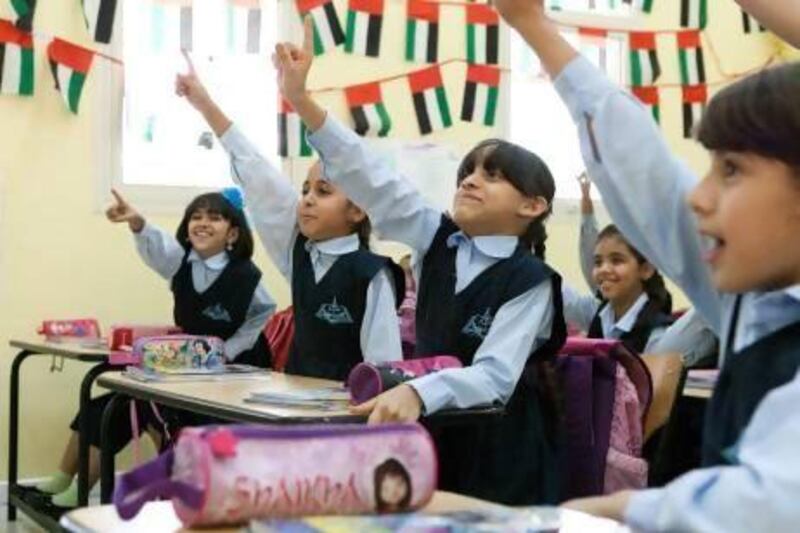DUBAI // More than half of all Emirati children in Dubai attend private schools but only 31 UAE nationals teach in them, a report has found.
The report suggests the lack of local teachers could hamper the development of national identity in the 29,752 pupils.
Chaltham Kanaid, author of the report released by Dubai’s Knowledge and Human Development Authority, said salaries were the biggest hurdle to attracting Emirati staff to the private system, in which 56 per cent of pupils learn in Dubai.
“Emirati pupils are our priority,” Ms Kanaid said.
“Teachers have higher salaries in government schools and naturally that will be their first choice. The question becomes how can we motivate the private sector to provide attractive offers?”
Of the Emirati children in the private system, 77 per cent are at 24 schools, which employ 2,500 teaching staff but only 13 nationals.
There are 148 private schools across Dubai.
And the school inspections bureau ranked many of the schools most popular among Emirati parents as acceptable, not outstanding.
Michael O'Brien, associate academic dean of education at the federal Higher Colleges of Technology, said graduates preferred state schools. One reason for this was cultural.
“Often there is a preference among [female] graduates to work in state schools because it will be an all-female environment,” Mr O’Brien said.
Ghada Al Mulla, a Grade 10 history teacher at the Asma Bint Al Numan High School, said she would never join a private school because they were not “culturally sensitive”.
“I cannot expect a private school to adopt all the Emirati values I would like to be a part of,” Ms Al Mulla said. She added that a job in a private school would also come with longer hours than she would like. “There is more workload and when you have a family it becomes difficult to manage.”
Ms Kanaid said the cooperation of teaching universities was needed to promote employment in private schools, but Mr O’Brien said the first priority for the colleges had to be the Emiratisation goals of government schools.
"The goal of all the federal universities at the moment is to try to help the Government meet its Emiratisation goals," he said.
"And together we are still not able to graduate as many teachers as required."
But the colleges do work with some private schools for student placement as part of their bachelor programmes.
Dr Samia Al Farra, chief education officer at Taaleem, which operates a dozen private schools in the UAE, said Emirati teachers should be encouraged to work in the private sector so they can be exposed to different teaching styles.
“It is necessary for them for growth and to broaden their career opportunities,” said Ms Al Farra. “They will work with colleagues from other nationalities and gain more experience.”
Dr Hasna Al Saeed is an Emirati mother from Dubai whose daughter is in Grade 3 at a private school that follows the Ministry of Education and American curriculums.
“I wanted her to study in private school because I want her to graduate with a strong base in English,” Dr Al Saeed said.
"But at the same time I wanted a school that would stay true to the Arab culture and give her the values I grew up with."
She would like to see more Emirati teachers at her daughter's school.
“I think children would be able to relate to the teachers more,” Dr Al Saeed said.
“But it is just as important is that they are well qualified and committed to teaching.”






